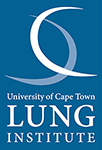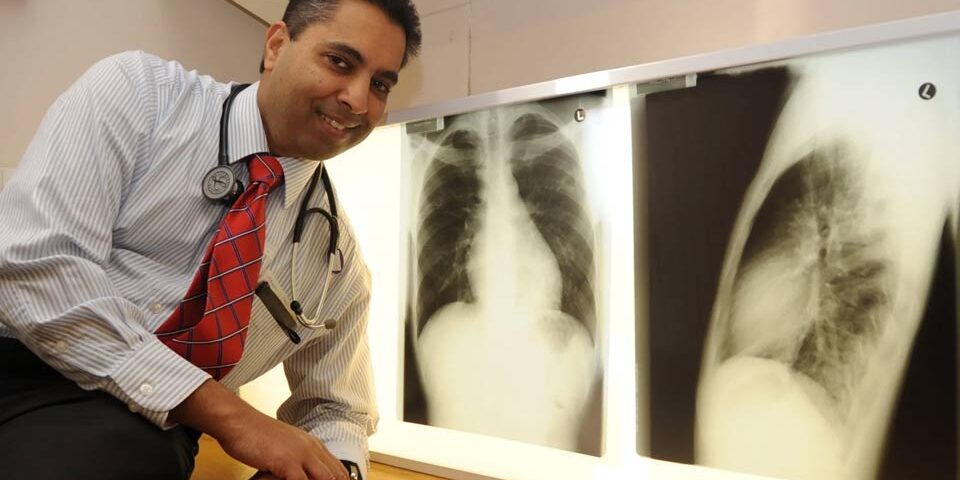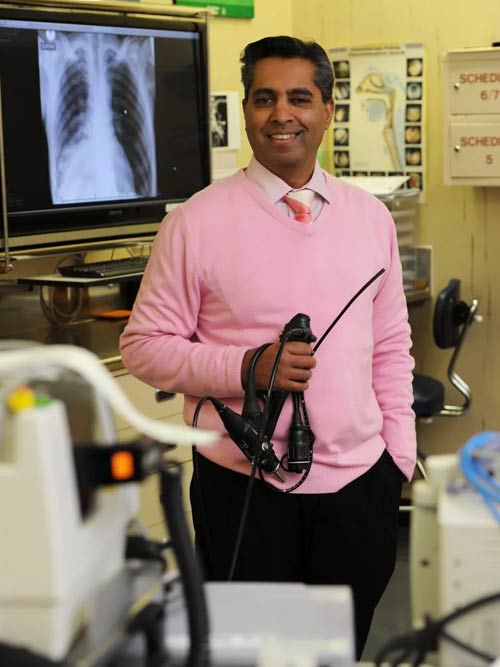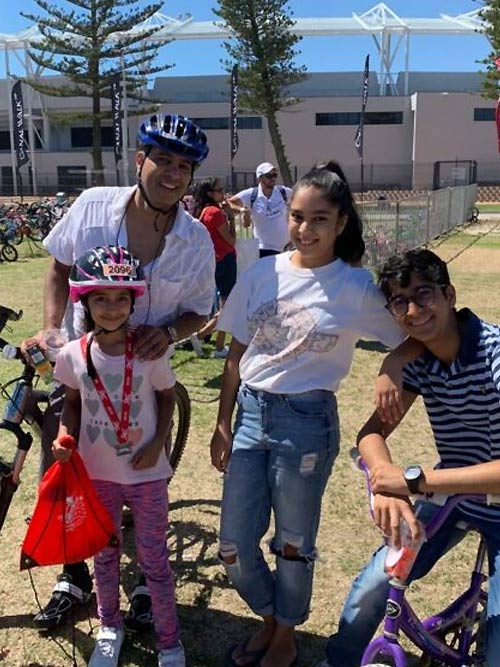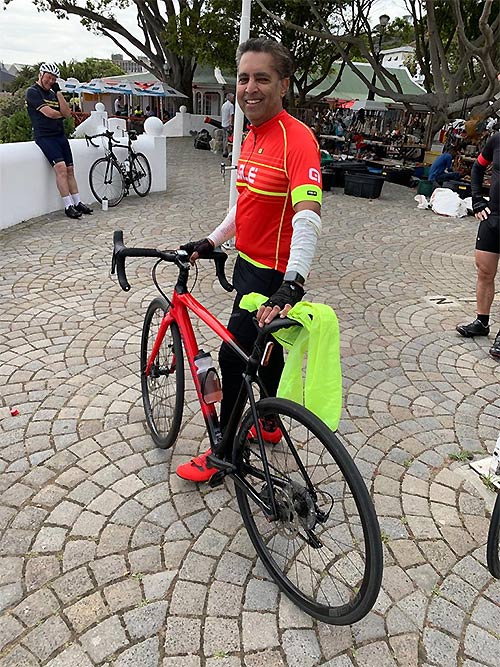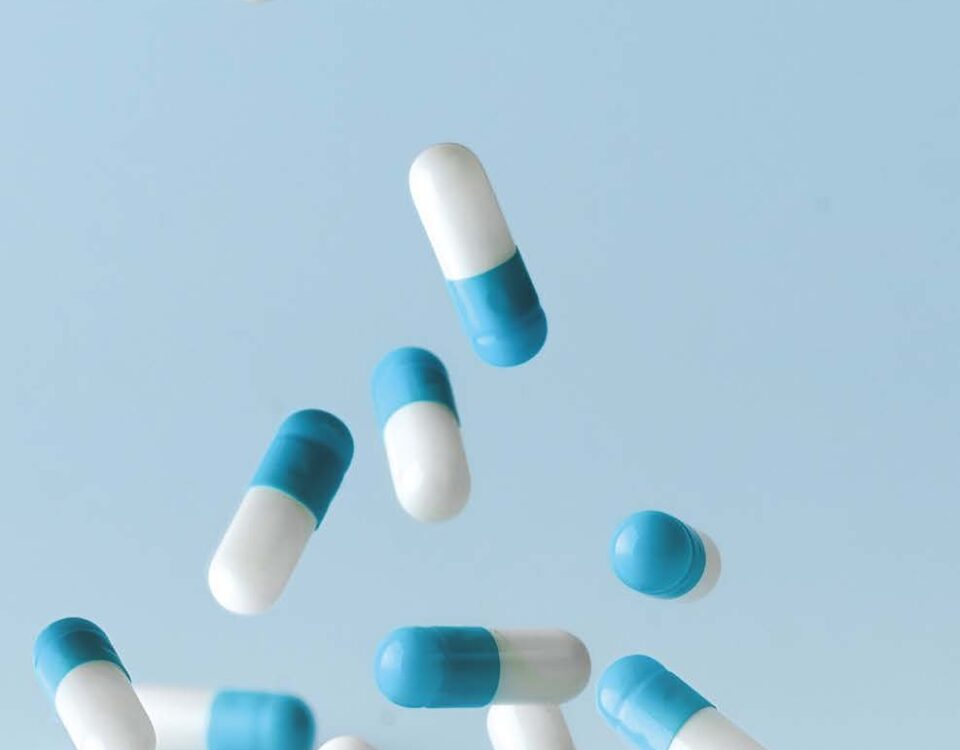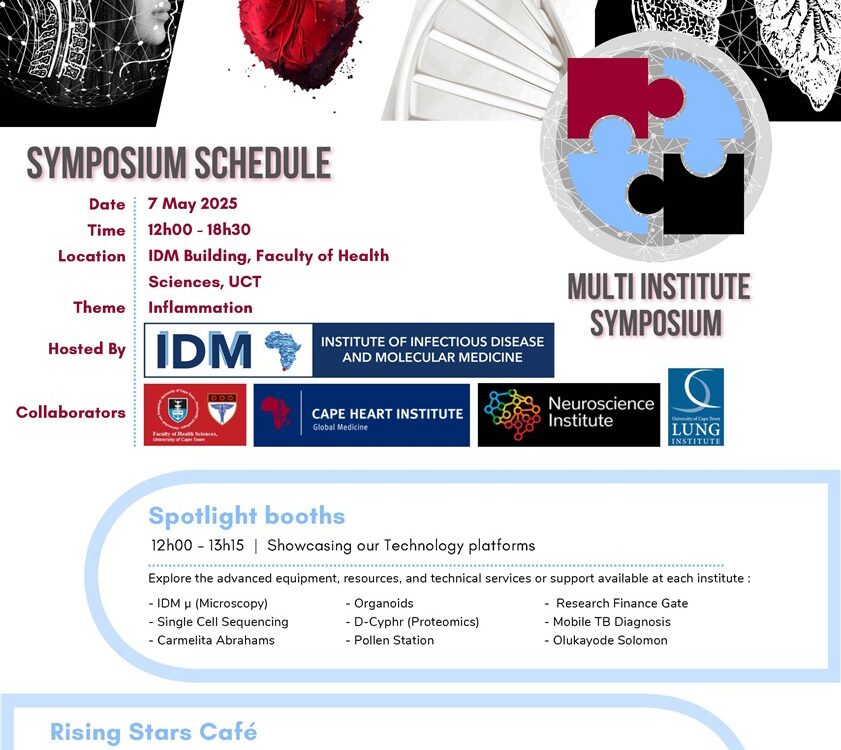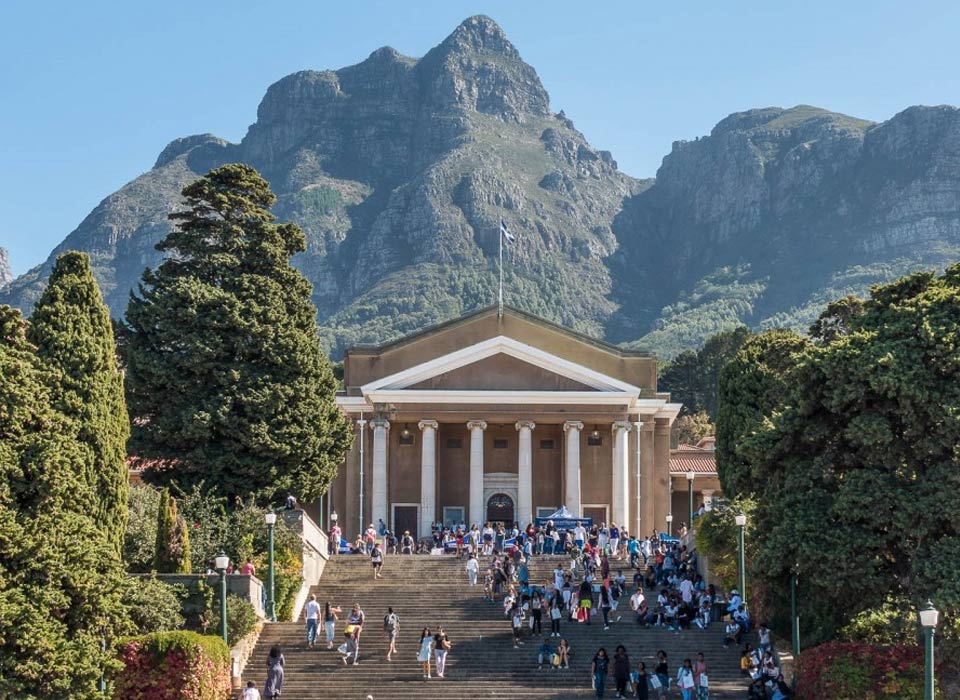
University of Cape Town: COVID-19 pandemic and lockdowns impact TB mortality
26th March 2022
Community engagement highlights of 2021
7th April 2022Spotlight, Biénne Huisman, 30 March 2022
Professor Keertan Dheda, head of the University of Cape Town’s Division of Pulmonology, and of Respiratory Services at the adjoining Groote Schuur Hospital, is speaking to Spotlight from his parents’ home in a retirement complex in Durban. He is in Durban for a TB trial site visit at the Inkosi Albert Luthuli Central Hospital.
Our conversation is off to a brisk start as he recalls completing the 109 kilometre Cape Town Cycle Tour despite adverse weather conditions earlier this month. “The start and just past Cape Point, it was sheeting with rain and lots of wind,” he says. “I struggled through the first half, but then it was fine and I managed to finish safely.”
This year he completed the race in 4 hours and 42 minutes, longer than his usual 4 hours and 15 minutes.
“All things considered, I’m happy with that,” he says. “I also made a little stop at Hout Bay for a couple of Cokes. The thing about cycling is, you’ve got to enjoy the race and event. Once you chase time only, you don’t have a chance to appreciate the scenery. I have actually started to not look at my clock anymore. And I found that when I stopped, my shoulder spasms went away. So I think it was all the stress of chasing numbers.”
Related Posts
- 400 people in SA with highly drug-resistant TB to get new three-drug regime
- Accelerated access to new drugs for MDR-TB
- After setbacks, rollout of new TB prevention pills to start in six districts
- Analysis: We need to do for TB vaccines what we’ve done for COVID-19
- COVID-19: The fascinating science of what happens in the lungs
- Fingerstick blood test shows promise for TB screening
- IN-DEPTH: The slow motion race for a TB vaccine
- Important TB drug as effective at lower dose, study finds
- In-depth: Landmark moment as AI beats humans in reading X-rays for TB
- Opinion: SA’s TB recovery doesn’t necessarily need a bigger budget, just reprioritisation
- Sub-clinical TB: Fascinating SA research helps push frontiers of TB science
- What is behind SA’s higher TB numbers?
- What should the TB priorities be in the new NSP?
- XACT III: A trial asking how to take TB tests to the people
On the topic of numbers, Dheda holds an extraordinary H-index of 88. (H-index or Hirsch index measures the global impact of a scientist’s research. A ranking of 60 is considered exceptional.) In South Africa, he has an NRF [National Research Foundation] A-rating, denoting him “a leading international scholar”.
Given his fast-paced career, could “appreciating the scenery” apply as a broader metaphor?
“Yes, I feel very strongly about prioritising,” says Dheda. “And that’s how I structure my day. We have to take moments to do important things; having a morning routine, an exercise schedule. Otherwise, it becomes a robotic existence, a drudgery. And so, one must be very careful not to overload the plate with what we call mundane tasks. You know, I’m really passionate about my patient interactions and research. I really enjoy the journey of analysing data, of figuring out problems. So these are things to focus on.”
Dheda gives two examples of problem-solving research that excites him.
One was a multi-drug resistant TB treatment trial about ten years ago, where they hoped to find an alternative to painful, hearing loss causing injectables. “When we planned that trial, it was a bit of a pipe dream,” he recalls. “Bedaquiline (a new drug with less harmful side effects than injectables, taken in pill form) had just come out. The challenge was how to combine it with other drugs in a shortened regimen of only six months, compared to the conventional 18 to 20 months. Today, bedaquiline is used as a first-line treatment in South Africa for multi-drug-resistant TB. Injectables are rarely used and only in exceptional cases. The data from our trial has defined a new aspirational threshold for the duration of multi-drug resistant TB treatment. It’s made a major splash and is currently being considered by the World Health Organization.”
Secondly, the ongoing development of a user-friendly, low-cost urine screening test for TB. Dheda explains that better tests are crucial, as globally two out of five cases of those newly ill with TB go undetected. In South Africa, COVID has resulted in a further 30% reduction in the detection of TB cases, with “undiagnosed or undetected persons” estimated at up to 200 000 people per year. In the latest of his many publications in leading medical journals, Dheda highlights the problem of the “missing TB” diagnoses in a World TB Day commentary published last week in The Lancet.
“One of the big problems we face is that we don’t have a sputum independent test for TB,” he says. “About 30 or 40% of people don’t have sputum [phlegm, a thick type of mucus in the lungs]. Or little kids, they can’t produce sputum. And our entire public health strategy relies on a sputum-based test. So about 12 years ago, we set out on finding a new set of biomarkers and chose urine. It’s easily available, it’s easy to collect. And we discovered a set of three selected biomarkers in the urine. These are proteins that will serve as a wonderful screening test for TB. So it will be an assay using urine, much like a pregnancy test. We hope to have it developed and ready for usage in the next five years.”
Dheda is a co-inventor on six patents, including the new urine test.
Among a long list of other initiatives, Dheda helped to pioneer Groote Schuur’s lung transplant service, now headed by specialist pulmonologist Dr Greg Calligaro and cardiothoracic surgeon Dr Tim Pennel. As far as Dheda knows, this is the only public lung transplant service in Africa.
During our interview, Dheda pauses to send Calligaro a WhatsApp message to obtain the latest lung transplant figures. Calligaro replies saying a total of 25 lung transplant surgeries to date, averaging about seven a year pre-COVID. Now with surgeries finally resuming, the team hopes to accelerate the service back to that number again soon.
A high-rise in central Durban
Dheda, one of three siblings, grew up in a one-bedroom apartment in a high-rise in central Durban, in the apartheid-era Casbah area. This area in Durban is seen as the equivalent of what was District Six in Cape Town. The area had no greenery or sports fields, so he played football in the surrounding streets. His father had a small clothing business, making ladies’ garments like dresses and coats. His mother helped his father and ran the home.
Dheda recalls how during the day one room in their home served as a lounge and a dining area. At night it became the children’s bedroom, where they slept on three folding beds kept in a cupboard in the passage. As a youngster, his wardrobe was a suitcase kept under his parents’ bed.
“I have only very good memories of my childhood,” he says. “We were not starving and there was a lot of love and care. I learned a lot of things. How to cut your suit, according to your cloth. How to be parsimonious. How to make things work despite hurdles.”
Drawn to problem-solving early, teenaged Dheda wanted to become either an engineer – to solve the energy crisis, which earned him the nickname “Energy Crisis Dheda” – or a doctor. He opted for medical school, graduating from the University of Witwatersrand in Johannesburg in 1992. He first turned to pulmonary medicine as an intern at King Edward VIII Hospital in Durban, where “HIV rates were astronomical, and the most common opportunistic infection was TB”.
Dheda went on to specialise in respiratory medicine in the United Kingdom, graduating with a PhD from University College London in 2005. Today he is still co-appointed as a Professor in Mycobacteriology and Global Health at the London School of Hygiene and Tropical Medicine.
He decided to return to South Africa around 2007 – “to give back, to be near my family, and because of the weather”. At the time, he was headhunted by UCT’s late health sciences dean Professor Bongani Mayosi.
“Professor Mayosi contacted me out of the blue saying, I hear you are looking to come back? And he said, look, the only place for you is Cape Town. I want you to establish a lab here in the Department of Medicine. See, that was the kind of guy Bongani was, very charismatic, very avant garde. He did a lot of capacity building. He was a visionary. I mean, he thought generations ahead.”
So Dheda moved to Cape Town, where he still lives with his wife and three children in Newlands.
At the time, peers joked calling him a “brain gain” – the opposite of brain drain. “You know, we are always talking about people leaving South Africa. But there are so many people who come back here; foreigners who come here, bringing their skills,” says Dheda.
“I just love South Africa and have no regrets [about] returning. We have fantastic weather and fantastic, talented people. The gees, that is a nice word. It’s the only word I can think of to describe what we have here.
But he is also realistic about the country’s many challenges.
“We have a really difficult and twisted past,” he says, “and there are a lot of hitches along the way. While we have to work through all of that, I think we’ll be okay.”
From a staff of three to over 90
At UCT in 2008, he initially had a staff complement of three – including himself – with so little money they could barely afford air-conditioning and second-hand office furniture.
“It was a bit of an anxiety moment for me because you are walking into a job where you don’t have guaranteed funding, right? There was some start-up funding that Bongani arranged from the deanery. If I remember correctly, it was an amount of R150 000. But, you know, sometimes you just have to take a leap of faith.”
Today, at UCT, he oversees over 90 staff members, with international grants running into hundreds of millions of rands.
“What’s important,” says Dheda, “is how in building this unit we had a lot of really bright and talented people that were trained. I mean, Richard van Zyl-Smit, who was recently awarded his full professorship, did his inaugural lecture last week. He was my first full-time PhD student and was one of the original three staff.
“There’s Prof Jonny Peter, head of the Division of Allergology and Clinical Immunology at UCT. Prof Shahieda Adams, now head of Occupational Medicine at UCT. Prof Rannakoe Lehloenya, a dermatologist at UCT. Dr Rubeshan Perumal [former pulmonologist at Groote Schuur’s Post-COVID-19 Lung Disease Clinic (interviewed by Spotlight here), who is now at Albert Luthuli Hospital in Durban. Dr Tunde Olayagu, a specialist now in Nigeria…”
‘We don’t have all the answers’
Dheda mentions what he describes as the “living legacy multiplier effect”. He explains: “Watching the career progress and achievements of my former students and mentees – several of them are now professors and have established new clinical services and, or their own research groups and they’re all training people in turn. It’s wonderful to see.”
Amongst Dheda’s own mentors are his parents and Mayosi. “One of Professor Mayosi’s very popular sayings was a journey of a thousand miles begins with a single step. And I quote this to my students. I say to them, this was Bongani’s popular line. I think it’s important to understand that we don’t have all the answers. Even as a senior, going forward there will be other mentors I will have. We are all learning all the time.”
Read the full text online https://www.spotlightnsp.co.za/2022/03/30/profile-keertan-dheda-reflections-on-a-career-finding-ways-to-fight-tb/
